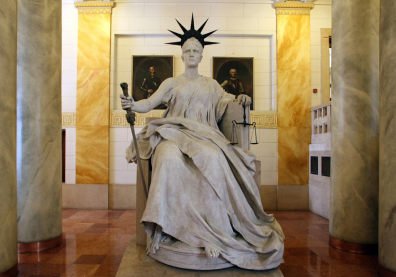Les Doctoriales de l'Europe médiane, de l'espace russe et (post-)soviétique (DEMEPS 2025) - Thinking justice

Les Doctoriales de l'Europe médiane, de l'espace russe et (post-)soviétique (DEMEPS)
The aim is to create a regular forum for dialogue between all researchers, teacher-researchers, doctoral students and post-doctoral fellows working on a wide area covering Medieval Europe, Russia and Central Asia, and, more broadly, all post-Soviet regions and states, across all disciplinary fields and periods.
With this in mind, researchers, teacher-researchers and directors from the main research units working on these regions or with responsibilities in the two CNRS GDRs, "Connaissance de l'Europe médiane" and "Empire russe, URSS, États ex-soviétiques" (GDR Est), have joined forces to provide a regular working framework for which these Doctoriales 2025 will be the third meeting, following the first edition held in June 2021.
These are aimed at doctoral students in their second year (i.e. 1st registration no later than September 1, 2024) and young doctoral students who have defended their thesis after January 1, 2022. Doctoral students enrolled in their 1st year of doctoral studies during the 2024-2025 academic year are welcome to participate in these exchanges.
Argumentary of the scientific event
On February 23, 2025, thousands of people gathered at Place de la République in Paris to commemorate the third anniversary of the start of the large-scale Russian invasion of Ukraine in 2022. Among the demonstrators, Dmytro Atamanyuk, a Ukrainian association leader, told journalists present: "There is less information about Ukraine circulating in the media. This is precisely what Vladimir Putin is counting on with his all-out war. [Ukraine certainly needs peace, but a just and lasting peace" (Nirhy-Lanto, 2025). The idea of "justice" in peace-building referred to by Mr. Atamanyuk is echoed in the statements of several high-ranking European officials. Whether Ukrainian President Volodymyr Zelensky, French President Emmanuel Macron (Teillard, 2025) or European Commission President Ursula von der Leyen (von der Leyen, 2025), the concept of "justice" has become part of the diplomatic discursive framework in the face of the prospect of possible negotiations with Russia, against a backdrop of pressure from the new US administration.However, this notion is also mobilized by the Kremlin, which seeks to pose as an actor of justice, reinterpreting the terms of the debate to its advantage (Kalinine, 2025). This semantic blurring, fuelled by Russian propaganda rhetoric, makes the conceptualization of a truly just peace all the more complex.
Far from being a uniform concept, the notion of justice takes on a plurality of meanings, opening up numerous fields of investigation. Even its usual definition immediately lays the foundations for broader reflection and encourages the emergence of multiple related questions. Indeed, the 9ᵉ edition of the Dictionnaire de l'Académie française, justice is defined as both:
- as "the principle by which one recognizes what is just and in accordance with the law; the moral requirement that one renders to each what belongs to him, that one respects the rights of others";
- as "the action of recognizing someone's good right, of granting him what it is right that he should obtain; the character of what is in accordance with the law, with equity" ;
as "the power to do right to everyone, to reward and punish; exercise of this power"; - as "the judicial authority, the institution comprising all the courts, magistrates and officers, which is responsible for administering justice";
- and finally, as "the allegorical figure, usually a blindfolded woman, by which justice is represented". (Académie française, 2000)
Among the plurality of avenues opened up by the notion of justice, these Demeps will focus on two: one centered on justice in wartime, considered in its regal sense, starting from the context of Russian aggression against Ukraine; the other exploring the relationship between justice and art, where creation becomes a place for questioning and representing the just.
Scientific event program
Thursday, November 13th, 2025
Inalco - Maison de la Recherche (2, rue de Lille - Paris 7e) - Auditorium Dumézil
- 1:30pm-1:45pm : Welcoming remarks: Mathilde Garnier and Denis Lakine (Inalco, CREE)
- 1:45pm-3:15pm : Panel 1: Justice in wartime - Ukraine - Russia
Moderation: Léa Xailly (Inalco, CREE)
-
Jean-Baptiste Godon (Sorbonne Université/CNRS, Eur'Orbem): The Council of Europe's ad hoc jurisdictional mechanisms: The Special Court for the Crime of Aggression against Ukraine and the Register of Damages for Ukraine
-
Samantha Marro-Bernadou (Montesquieu Research Institute): International law as a tool to serve justice during war? The example of Ukraine
-
Arnold Khachaturov (EHESS, CERCEC): Justice through data: the quantification of Russian military losses in the war in Ukraine
- 3:15pm-4:15pm : Panel 2: Art and justice
Moderation: Sylvia Chassaing (Inalco, CREE)
-
Liudmila Oshchepkova (independent): Russian national anthems as instruments of the politics of memory: linguistic analysis of images and meanings
-
Kateryna Tarasiuk (University of Strasbourg, GEO): The war diary of Victoria Amelina: from justice represented to justice embodied
- 4:15pm-4:30pm : Closing remarks: Mathilde Garnierand Denis Lakine (Inalco, CREE); Doctoriales glass
Organization
-
Mathilde Garnier (Inalco, CREE)
-
Denis Lakine (Inalco, CREE)